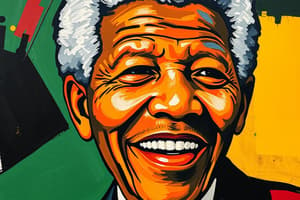Podcast
Questions and Answers
What does the term 'apartheid' mean in Afrikaans?
What does the term 'apartheid' mean in Afrikaans?
- Separateness (correct)
- Equality
- Freedom
- Unity
Which racial groups were classified under apartheid laws?
Which racial groups were classified under apartheid laws?
- White, Black, Indian, and Coloured (correct)
- White, Black, Indian, and Chinese
- Black, Indian, Coloured, and Asian
- White, Black, Asian, and Coloured
What was one of the key features of the apartheid system?
What was one of the key features of the apartheid system?
- Segregation of public facilities (correct)
- Equal voting rights
- Integration of communities
- Interracial marriage
What was Nelson Mandela's role in the anti-apartheid movement?
What was Nelson Mandela's role in the anti-apartheid movement?
How many years did Nelson Mandela spend in prison?
How many years did Nelson Mandela spend in prison?
In which year was Nelson Mandela released from prison?
In which year was Nelson Mandela released from prison?
What did Mandela focus on during his presidency?
What did Mandela focus on during his presidency?
Which award did Nelson Mandela receive in 1993 for his efforts?
Which award did Nelson Mandela receive in 1993 for his efforts?
Study Notes
Apartheid in South Africa
- Apartheid was a system of institutionalized racial segregation and discrimination enforced by the National Party government in South Africa from 1948 to 1994.
- The term "apartheid" means "separateness" in Afrikaans.
- Apartheid laws classified citizens into four racial groups: White, Black, Indian, and Coloured.
- The system denied basic human rights to non-White citizens, including the right to vote, education, and employment.
Key Features of Apartheid
- Segregation of public facilities, such as beaches, buses, and hospitals.
- Prohibition of interracial marriage and sexual relationships.
- Forced relocation of non-White people to townships and homelands.
- Denial of citizenship and voting rights to non-White people.
Nelson Mandela
- Nelson Mandela was a key figure in the fight against apartheid in South Africa.
- Born on July 18, 1918, in Mvezo, South Africa.
- Mandela became involved in the anti-apartheid movement in the 1940s and co-founded the African National Congress (ANC) Youth League.
- In 1962, Mandela was arrested and sentenced to life imprisonment for his activism.
Mandela's Imprisonment and Release
- Mandela spent 27 years in prison, including 18 years on Robben Island.
- During his imprisonment, Mandela became an international symbol of resistance against apartheid.
- In 1990, Mandela was released from prison after international pressure and negotiations with the South African government.
Mandela's Presidency and Legacy
- In 1994, Mandela became the first Black president of South Africa, serving from 1994 to 1999.
- Mandela's presidency focused on reconciliation and rebuilding the country.
- He established the Truth and Reconciliation Commission to investigate human rights abuses during apartheid.
- Mandela received the Nobel Peace Prize in 1993 for his efforts to end apartheid and promote racial reconciliation.
Apartheid Overview
- Apartheid, meaning "separateness" in Afrikaans, was enforced by the National Party in South Africa from 1948 to 1994.
- The system established four racial groups: White, Black, Indian, and Coloured, severely limiting rights for non-White citizens.
- Basic human rights denied included voting, education, and employment opportunities.
Key Features of Apartheid
- Public facilities, such as beaches and hospitals, were segregated based on race.
- Interracial marriage and sexual relationships were prohibited by law.
- Non-White individuals were forcibly relocated to designated townships and homelands.
- Non-Whites were denied citizenship and the right to vote in national elections.
Nelson Mandela
- Nelson Mandela, prominent anti-apartheid activist, was born on July 18, 1918, in Mvezo, South Africa.
- He became active in the anti-apartheid movement in the 1940s and co-founded the African National Congress (ANC) Youth League.
- In 1962, Mandela was arrested and sentenced to life imprisonment for acts of resistance against apartheid.
Mandela's Imprisonment and Release
- Mandela endured 27 years in prison, with 18 years spent on Robben Island.
- He emerged as a powerful symbol of resistance against apartheid while incarcerated.
- Mandela was released in 1990 due to international pressure and ongoing negotiations with the South African government.
Mandela's Presidency and Legacy
- In 1994, Mandela was elected as South Africa's first Black president, holding office until 1999.
- His presidential tenure prioritized national reconciliation and rebuilding post-apartheid South Africa.
- He initiated the Truth and Reconciliation Commission to address human rights abuses during apartheid.
- In 1993, Mandela was awarded the Nobel Peace Prize for his role in ending apartheid and fostering racial harmony.
Studying That Suits You
Use AI to generate personalized quizzes and flashcards to suit your learning preferences.
Description
Explore the complex history and key features of apartheid in South Africa, a system of racial segregation that lasted from 1948 to 1994. Learn about the impacts on various racial groups and the struggle against this oppressive government, led by figures such as Nelson Mandela.




